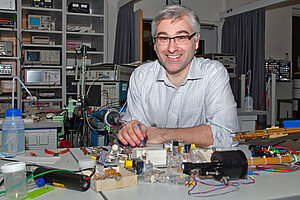The Marie Skłodowska-Curie Research Individual Fellowship Programme is directed at experienced researchers aiming for career development by focusing on international collaborations and innovative interdisciplinary scientific research. On January 28th, Jason W. Sidabras, research engineer at MPI CEC and PhD student at TU Dortmund, was awarded the prestigious fellowship. We have talked to him about this award:
What does this fellowship mean to you?
The MSC Fellowship provides a mechanism for me to focus on my career in Electron Paramagnetic Resonance (EPR) resonator development with applications in metallo-proteins, such as the hydrogenases that Prof. Lubitz has been studying. Each proposal is vetted in a peer-review process with emphasis on innovation, excellence, impact, and implementation. This award furthers my career as an independent researcher.
How did you get there?
In the summer of 2003, I started my career as a research engineer in the Department of Biophysics National Biomedical EPR Center at the Medical College of Wisconsin. For 12 years, from 2003-2016, I studied under Profs. James S. Hyde and Richard R. Mett. They were indispensable mentors with whom I share a number of publications. My publication record is filled with EPR
instrumentation, methodology, resonator probe design, site-directed spin labeling and other magnetic resonance scientific interests.
As of March 2016, I have moved to Germany to pursue an exciting and prestigious career at the Max Planck Institute for Chemical Energy Conversion under <link _blank internal-link internal link in current>Dr. Edward J. Reijerse and <link _blank internal-link internal link in current>Prof. Wolfgang Lubitz. At MPI CEC I will lead the development of EPR resonator probe developments for the study of [FeFe]-hydrogenase protein single crystals. These single crystals are in the sub-nanoliter volume and require novel resonator and instrumentation development to increase the EPR sensitivity.
So, what comes next?
The MPI CEC provides an internationally recognized scientific environment to host this fellowship and to continue my multidisciplinary approach to technology research and development. I will also be using the MSC Fellowship to obtain my PhD at TU Dortmund under mentorship of Profs. Dieter Suter and Wolfgang Lubitz. I currently hold 2 U.S. Patents and one W.O. Patent, have 25 peer-reviewed publications, over 31 abstracts at EPR and MRI conferences, and 8 invited international talks. The MSC fellowship will allow me to further disseminate my research both in Germany and abroad by providing funds for international travel and open-access publishing.
The MSC Fellowships are considered Europe’s most competitive and prestigious awards and that is why I am very proud to say that my proposal scored in the 98th percentile of the Physics Scientific Panel and 95th percentile overall. I look forward to a successful two years of funding and furthering basic scientific knowledge in the catalytic activity of hydrogenase.
Dissemination for this project will be hosted at <link http: act-epr.org _blank external-link-new-window internal link in current>
. More information will be available as the fellowship moves forward.When you’re not in the lab, what do you do?
Since moving to Germany, my wife and I have been enjoying travelling to different countries and cities all over Europe. Back home we have especially enjoyed the “Weihnachtsmarkt” and travelled to 12 different Germany cities to join in the festivities. We appreciate a fine cup of coffee and frequent the pottschwarz coffeeshop in Mülheim regularly.

